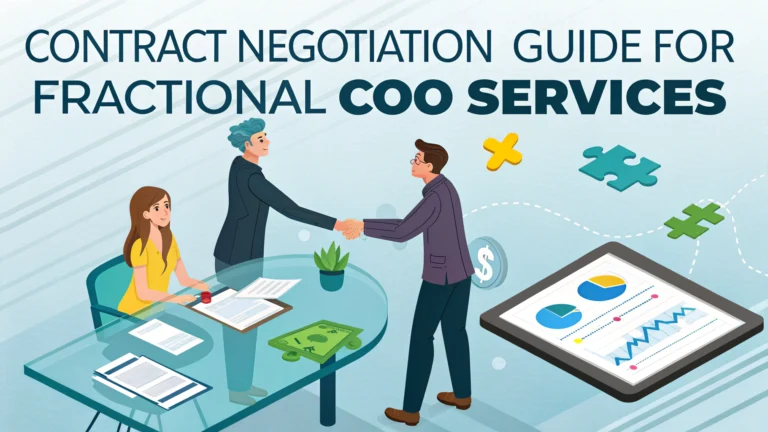Contract negotiations for fractional COO services require careful consideration of scope, deliverables, and expectations to ensure a successful partnership.
Understanding the specific needs of your organization and aligning them with the expertise of a fractional COO helps create a foundation for meaningful negotiations.
This guide outlines key elements to consider when negotiating fractional COO contracts, helping both parties establish clear terms and avoid potential misunderstandings.
Essential Contract Components
- Scope of services and responsibilities
- Time commitment and availability
- Rate structure and payment terms
- Performance metrics and KPIs
- Contract duration and termination clauses
- Confidentiality and non-compete agreements
Defining Scope and Responsibilities
Document specific areas of responsibility, such as operations management, team leadership, or process optimization.
Clear boundaries between the fractional COO’s role and existing leadership positions help prevent overlap and confusion.
Time and Availability Requirements
- Weekly or monthly hour commitments
- On-site vs. remote work expectations
- Emergency availability protocols
- Meeting attendance requirements
- Response time expectations
Compensation Structure
| Payment Model | Best For |
|---|---|
| Hourly Rate | Project-based work, variable needs |
| Monthly Retainer | Ongoing support, consistent engagement |
| Project-Based | Specific initiatives or transformations |
Performance Metrics
Establish measurable outcomes that align with organizational goals and objectives.
- Operational efficiency improvements
- Cost reduction targets
- Team performance indicators
- Project completion milestones
- Revenue growth metrics
Contract Duration and Exit Terms
Specify initial contract duration, renewal options, and notice periods for termination.
Include clear terms for early termination and associated fees or obligations.
Intellectual Property and Confidentiality
- Ownership of work products and innovations
- Data access and security protocols
- Non-disclosure agreements
- Post-engagement confidentiality terms
Communication and Reporting
Define regular check-ins, progress reports, and communication channels.
- Weekly status updates
- Monthly performance reviews
- Quarterly strategy sessions
- Stakeholder communication protocols
Next Steps for Success
Review the contract with legal counsel to ensure protection of both parties’ interests.
Document all agreements in writing and maintain open communication channels throughout the engagement.
Regular contract reviews and adjustments help maintain alignment with evolving business needs.
Contact professional COO organizations or business advisory services for additional guidance on contract structuring.
Risk Management and Insurance
Address potential risks and liability concerns through appropriate insurance coverage and contractual protections.
- Professional liability insurance requirements
- Indemnification clauses
- Dispute resolution procedures
- Risk sharing agreements
Technology and Resource Access
Specify required tools, systems, and resources needed for effective service delivery.
- Software and platform access
- Equipment provisions
- Team member access levels
- Documentation requirements
Scalability and Growth Provisions
Include terms for adjusting services as organizational needs evolve.
- Service level expansion options
- Additional resource allocation
- Role transition protocols
- Growth-based compensation adjustments
Securing Long-Term Partnership Success
Establish a foundation for sustainable collaboration through comprehensive contract terms and clear expectations.
- Regular contract review schedules
- Performance evaluation frameworks
- Relationship management protocols
- Continuous improvement mechanisms
Focus on creating value-driven partnerships that support organizational growth and operational excellence.
Maintain flexibility while ensuring accountability through well-structured agreements and open communication channels.
FAQs
- What is a fractional COO and why would I need contract negotiation for their services?
A fractional COO is a part-time Chief Operating Officer who works with multiple companies, providing executive-level operational expertise on a flexible basis. Contract negotiation is essential to clearly define scope, responsibilities, time commitment, and terms of engagement. - What are the key elements that should be included in a fractional COO contract?
Key elements include scope of services, time commitment, compensation structure, confidentiality agreements, intellectual property rights, termination clauses, performance metrics, and dispute resolution procedures. - How is pricing typically structured for fractional COO services?
Pricing can be structured as hourly rates, daily rates, monthly retainers, project-based fees, or hybrid models combining fixed and variable components based on performance outcomes. - What should be the minimum contract duration for engaging a fractional COO?
Most fractional COO engagements require a minimum commitment of 3-6 months to ensure meaningful impact and proper implementation of operational improvements. - How should intellectual property and confidentiality be addressed in the contract?
The contract should clearly specify ownership of intellectual property created during the engagement, include comprehensive non-disclosure agreements, and address potential conflicts with other clients. - What termination clauses should be included in a fractional COO agreement?
Termination clauses should specify notice periods, conditions for early termination, transition responsibilities, and any associated fees or penalties. - How should performance metrics and accountability be structured in the contract?
The contract should define specific KPIs, reporting requirements, evaluation periods, and mechanisms for reviewing and adjusting goals based on business needs. - What liability and insurance requirements should be addressed in the contract?
The contract should specify professional liability insurance requirements, indemnification clauses, and clear boundaries of responsibility between the fractional COO and the company. - How should the scope of work be defined to prevent scope creep?
The contract should include detailed service descriptions, specific deliverables, excluded activities, and processes for handling additional work requests or scope changes. - What communication and reporting expectations should be outlined in the contract?
The agreement should specify regular meeting schedules, reporting formats and frequency, communication channels, and response time expectations.







